Software Audits from Oracle, SAP, Microsoft, and Salesforce: What You Should Know


Getting an audit notification from your software provider can be nerve-wracking, but after reading this you’ll realize this is less likely due to something you’ve done wrong and more likely a tactic to throw you off-course.
If you’ve never been through an audit before, you don’t know what to expect, what to do, or how to make sure it’s over as quickly as possible with minimal expense to your organization.
In this article, we’re going to make all this crystal clear by outlining the audit processes of large enterprise software providers like Oracle, Salesforce, SAP, and Microsoft. There are a few key things you need to take into account that apply to all of these providers: ● Use your contract as your best weapon to defeat audits. Take action if there is any sort of grey space in terms of what is allowed by the supplier.
- Use your contract as your best weapon to defeat audits. Take action if there is any sort of grey space in terms of what is allowed by the supplier.
- You’ll do best if you bring in outside assistance. An expert who has experience guiding businesses through software audits will be a huge help throughout the process.
- You need to control all the information that is shared with the supplier in your own format and spreadsheets.
- The more you are proactively sharing information with suppliers, the less basis they have to bring up an audit.
- Audits are brought forth to customers for many commercial reasons. The more proactive you (the customer) are with sharing information, addressing audit risks in meetings, and creating a paper trail, the less likely your supplier is to audit you.
What is a Software Audit and How Did Your Company Get Selected for One?
A software audit is both a technical and contractual review of your organization’s use of a specific software platform within your IT environment. Most large enterprise software companies like Oracle and SAP have separate departments that focus purely on license compliance audits. These teams look and feel like a shared service organization inside of a large software company. They work with a customer’s account management team to take an aligned, yet separate and distinct, position on behalf of their software company. We will discuss the similarities and differences between these different teams later in the article.
One common similarity across all of these suppliers is that the audits will compare your usage and processes to any specifications, standards, or contractual agreements in place.
Why your company? Why did you get singled out for an audit?
There are three primary operational/contractual triggers for a software audit:
- If there is any sort of consumption-based pricing in your contract;
- If you have any sort of restricted-use license in which you are only allowed to use a license for certain functionality; or,
- If you have recently acquired or divested a company.
While not mutually exclusive, you’ll also find the timing of these audits is very suspect and robotic in nature. The two primary timing triggers are:
- Anytime a large software company needs to identify “unearned revenue” to meet quarterly revenue targets; and,
- A pending contract renewal.
These large enterprise software companies know that it’s very common for their customers to be out of compliance due to the sheer size and scope of their operations. This is augmented by the fact they know anytime there is employee turnover within a customer’s IT organization (especially their “software asset management” department) the company is susceptible to additional compliance risk as a result of lost tribal knowledge of the environment, past internal audits, etc.
Taking all of this into consideration makes it relatively easy to understand why a company like Oracle can confidently predict net new revenue from their existing client base.
In addition to market pressure for additional revenue, a customer’s upcoming contract renewal also serves as an all too common trigger. The general rule of thumb we tell clients is anytime you have a contract renewal coming up nine to twelve months, your supplier is likely to introduce an audit. Your supplier will use this as an opportunity to distract you and gain the upper hand in an anticipated contract negotiation that hasn’t even started.
Suppliers do this because it automatically puts you in a defensive position. Naturally, you will be forced to concentrate on defeating the audit instead of allocating that same time to figuring out what you need for the upcoming contract renewal. They want to gain as much leverage and understanding of your business as possible before going into a renewal negotiation.
The audit is merely a tactic large software providers use to 1) seek out unearned revenue for their company to meet revenue targets and 2) gain the upper hand in your contract renewal negotiations in the hopes of minimizing any revenue loss from your account.
The fact of the matter is that it’s very common for customers to be unintentionally out of compliance. Knowing this, it’s important you know what to do in order to defend your company from what is potentially a very costly situation.
Here’s an example to help illustrate this tactic
By way of an audit, an ERP provider could discover you are misusing the license, giving the supplier reason to charge you a larger fee. Often, sales revenue targets for these audits are about 30% of your annual maintenance/subscription costs.
Let’s say you are spending $1M on core licenses, the audit will likely lead to around $300k in costs on top of that. If you can defeat the audit and keep your core license costs at $1M, then you will be happy and reward yourself for fending off the extra charges. In reality, the supplier didn’t expect the $300k in the first place, the audit was just a way to distract you from putting time and effort into your upcoming renewal negotiation.
It’s a win-win situation for them - if they win the audit, they put the money towards their sales revenue to meet their quota; if they don't, they’ve distracted you from being prepared to save money on your upcoming contract negotiation.
As a sales rep, finding new business is much harder than auditing an existing customer. Suppliers will target big companies because they don’t have perfect internal controls and mistakes are likely to happen.
What to Do When You Get an Audit from Oracle
When Oracle conducts an audit, they engage their License Management Services (LMS) team to run the process.
The audit process often involves installing software code within your secure environment. It is a listener software that will hit your mainframe servers and figure out how many other systems are connected.
This is important because, historically for this on-premise software, you are licensed based on the interconnectedness of both physical and virtual server environments. Your supplier wants to know how much “value” you are getting from their platform so the software they install provides a report of how many systems are interconnected. In a nutshell, the software delivers a report that illustrates when your technical architecture is in non-compliance. This automatically gives Oracle the upper-hand as it forces the customer to validate the information.
The best tactic to defeat this process is to never allow the software in your environment to begin with.
You have the right to refuse listening software within your Oracle contract.
Unless your contract explicitly calls out installing software, tell Oracle that installing software does not comply with your IT security protocols.
Look to determine if you have audit language specified in your contract. The older the contract you have with Oracle, the more likely you have the right to refuse the audit, or to at least not allow the listener software to be installed within your environment.
If this is the case, tell Oracle that instead of installing the software, you will run the audit yourself using their tools and spreadsheets with no software included. This means you are in control of what information is being shared with Oracle. Controlling the information is incredibly important in any audit, especially when suppliers are involved.
What to do when Salesforce Conducts an Audit
Salesforce audits customers when there is a restricted-use license available. When this happens you need to think critically about negotiating with Salesforce.
Salesforce is Software as a Service (SaaS) in the cloud which means they have more ability to freely monitor your utilization of licenses within your environment and can freely audit for misuse.
When you have a Restricted Use License (RUL), you have permission to use the product for a specific business purpose leveraging a certain number of standard and custom objects. Standard objects are modules within the Salesforce platform, such as contacts, accounts, or prospects. A custom object is something that was built by a Salesforce developer specifically for your company.
The license limitations in an RUL are a contractual limitation, not a technical one. A contractual limitation means there is legal language on your Order Form specifying how the license may use a predetermined number of standard/custom objects even though there is a set quantity limitation, technically there is no way to shut off access to other custom objects for that user.
This license is often in place for a subset of users who only need limited access to your tool. For example, an employee who is only viewing the data and not editing it. If this group starts editing objects, it becomes in and of itself a compliance issue.
Salesforce makes it easy for the end-user to accidentally do this without realizing they are in breach of the license. They will use this opportunity to accuse you of using the license incorrectly and request that your organization upgrade these licenses to full users and will seek compensation since the inception of the misuse. Contractually, Salesforce has the right to charge you full retail price for those non-compliant users.
Another time when Salesforce audits come into play is when a client is on a SELA Agreement (Salesforce Enterprise License Agreement).
How do you get around Salesforce RUL audit problems?
The best thing you can do is to establish quarterly check-ins with your account team at Salesforce. Use these meetings to stay on the same page with your account team and create a paper trail that shows how your users are engaging with the platform.
If you are accused of breaching restricted use, but have established quarterly check-ins with a paper trail, you can respond to Salesforce by saying “We met with your team and they didn’t bring anything up during our meeting so why should we believe you now?” Without quarterly check-ins and a paper trail, you get into a he-said-she-said argument.
Often times, the employee in breach of license may have accessed the wrong objects once or twice throughout the life of an account. Salesforce will create an argument that the license has been systematically misused for a long period of time.
We treat this event like a litigation. If you don’t have a paper trail of record, then you have no legal foundation for a defense. When comparing the perspective outcome of the party that has records and the other that does not, the person with records almost always wins in court.
Keep careful documentation about your interactions with Salesforce, and have open conversations about audit and license use risk. This will build a strong foundation and reduce the risk of an audit.
How to Handle an Audit from SAP
An audit by SAP is very similar to an audit by Oracle in that, historically, their licensing model is primarily “consumption-based.” This means your price is based on your company’s revenue, profit, services used, how many suppliers you have, or any number of a series of variables.
This model falls under the concept of Value-Based Pricing and is a subjective assessment of value captured from the utilization of the software.
SAP will use many of the same tactics as Oracle which we’ve outlined above. One thing to specifically note about SAP is that they very frequently introduce audits during merger & acquisition (M&A) announcements. When supporting clients with M&A IT Sourcing, we commonly tell our clients to “get ready for the ‘ransom letter.’” These aren’t our words but rather those of our clients who received notifications from suppliers such as SAP immediately after announcing a large acquisition to the market.
Want to know if you’re susceptible to these ‘ransom letters?’ Take a look at your contract and keep an eye out for any language within your contract that indicates they will “readdress the terms of the contract if you the customer acquires or divests entities during the term of the contract.” If you have this language within your contract you will more than likely receive a similar notification within 1 month of publicly notifying your M&A intent.
In order to defeat an SAP audit, take the same approach we would take with Oracle and then protect yourself moving forward by changing your pricing model to a fixed baseline model that is attached to the reasonably certain variables in your company such as the number of employees.
What to Do When Microsoft Audits You
Microsoft’s audits vary depending on the products and services within your contract. Similar to Salesforce, Microsoft will commonly focus on those licenses that have restricted use. A very common audit for those clients with perpetual Microsoft Office licenses is the 1-to-1 validation of windows desktop licenses to computers within a customer’s environment. Similarly, for those clients with an active Office 365 subscription, Microsoft will look closely at the utilization of subscriptions that are inherently limited in their intended use. This is augmented by a deep analysis of computers and users in your ecosystem to ensure the capabilities being used are properly licensed.
If you are paying for any physical or virtualized servers from Microsoft within an SCE agreement, you will commonly be audited to ensure your consumption metrics are within your contracted allocation.
Frequently with Microsoft, you are leasing the utilization of servers either on-premise or in the cloud. Generally speaking, if you have a physical piece of hardware from Microsoft on-premise, they will almost certainly conduct an audit at renewal time to monitor utilization as part of their “optimization analysis.” In a nutshell, they will try to move you from an on-premise environment to the cloud.
Conceptually this is fine but they will use that audit as leverage to do a lift and shift into Microsoft Azure.
Microsoft Azure is a very attractive product for the sales team because they are heavily incentivized to get your company into the cloud. The market is looking at how Microsoft’s cloud growth is going year after year and as a result, the company wants to increase its usage.
Essentially, Microsoft will audit to try and sell you on Azure. This isn’t necessarily a bad move to make but knowing key motivators will keep you ahead of the game and alleviate any potentially detrimental surprises.
What Happens Next?
If you’ve been audited by any of your enterprise software providers, we recommend bringing in outside help to guide you through the process. Leveraging their experience and expertise will go a long way to mitigate both short and long term risk that can easily rise into the millions.
Don’t solely believe what your account executive is telling you, oftentimes they don’t have all the information needed and they are heavily incentivized by their employers.
Your outside expert will be able to comb through your contracts, identify risks/opportunities, and drive both cost savings and containment. With the proper assistance, you’ll be able to confidently stand your ground and mitigate risks before they are realized.
More resources
From Fortune 500 giants to fast-growing innovators, TNG has helped clients save 20% – 40%+ on enterprise software contracts — even when they thought it was impossible
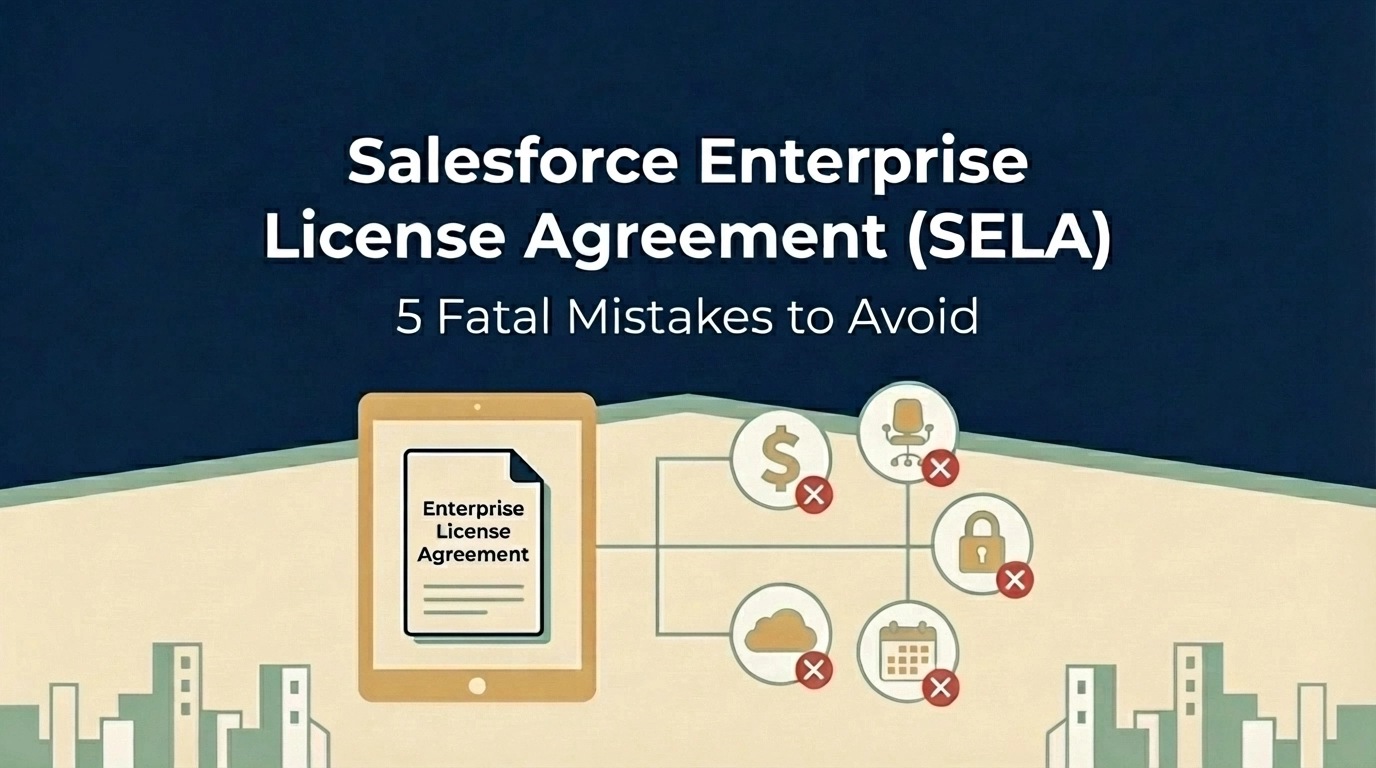
Are You Making These 5 Fatal Mistakes with Your Salesforce Enterprise License Agreement?
Your Salesforce Enterprise License Agreement (SELA) could be costing you millions more than it should. While these multi-year deals promise predictable pricing and enterprise-grade support, they're riddled with traps that can drain your IT budget faster than you can say "CRM transformation."
As someone who's seen countless enterprises stumble through salesforce renewal negotiations, I can tell you that most organizations make the same critical mistakes, and pay dearly for them. Whether you're a CIO planning your next renewal or a CFO trying to control spiraling software costs, these five fatal errors could be sabotaging your bottom line.
Mistake #1: The Baseline Trap, Overcommitting Based on Inflated Projections
Here's how it usually goes: Salesforce looks at your current usage, adds a "growth buffer," and locks you into user counts that seem reasonable today but become millstones tomorrow. This baseline trap is the most expensive mistake you can make in salesforce contract negotiation.
The problem? You're committing to licenses you may never use, and your per-user pricing gets locked at rates based on inflated projections. I've seen companies commit to 2,000 users when they realistically need 1,200, just because their sales rep painted a rosy picture of "inevitable growth."
The Fix: Negotiate growth as an option, not a requirement. Structure your SELA so you commit to baseline usage (say, 1,000 users in Year 1) with optional tiers that trigger only when specific business events occur: like a new subsidiary acquisition or product launch.
For example: "Client commits to 1,000 users in Year 1. If the European expansion launches by Q2, user count increases to 1,200. Otherwise, Year 2 renews at 1,000 users with the same discount structure."
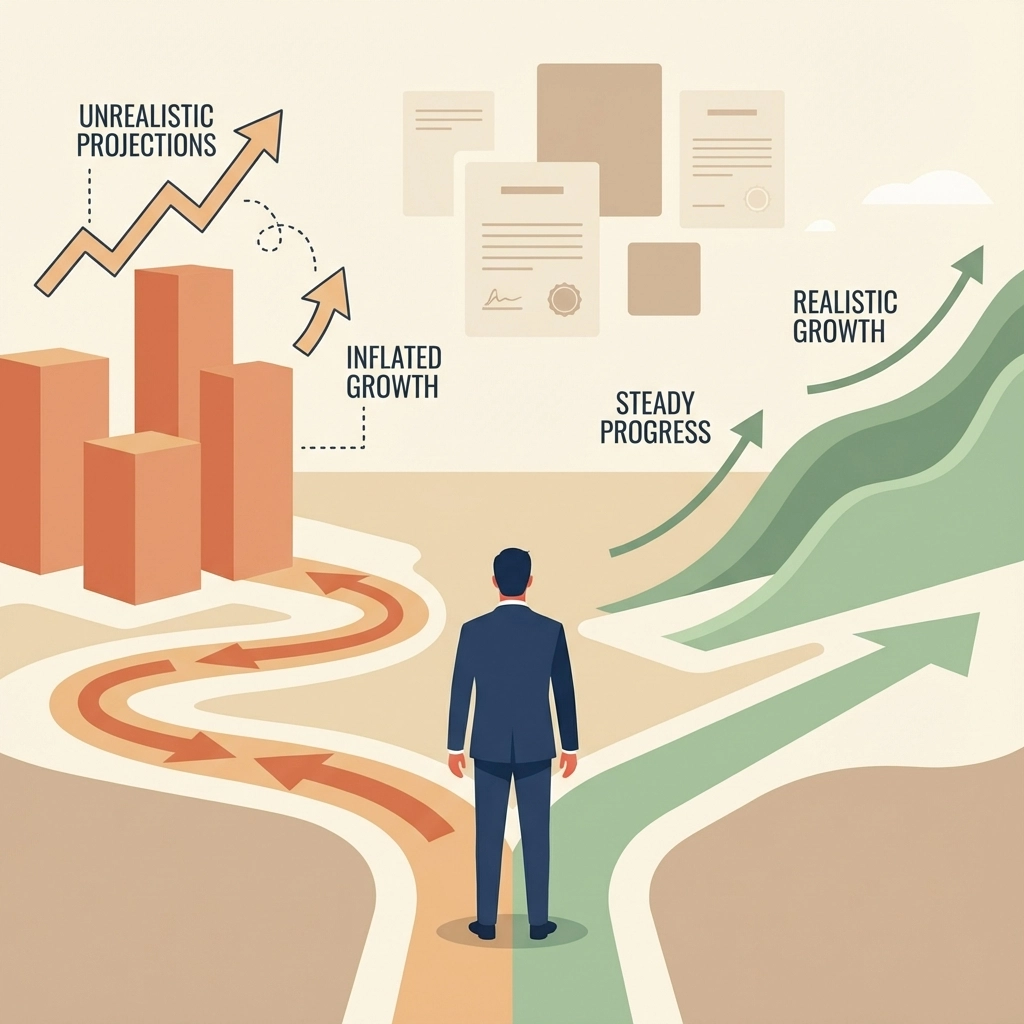
Mistake #2: Ignoring Overage Penalties and Price Escalations
Most executives focus on the upfront discount and completely overlook two budget killers hiding in their SELA: overage fees and automatic price increases.
Salesforce charges overage fees at current retail pricing: often 2-3x your negotiated rates. Exceed your licensed user count by just 10%? You're paying full retail for those extra seats. Meanwhile, most SELAs include automatic 7% annual price increases that compound over multi-year terms.
I recently worked with a Fortune 500 company that discovered they were paying $400,000 annually in overage fees: money that could have funded their entire digital transformation initiative.
The Fix:
- Cap annual price increases at 3% maximum (better yet, negotiate them out entirely)
- Pre-negotiate true-up rates at your discounted SELA pricing, not retail
- Build in a 90-day grace period for overages to avoid surprise charges
- Require monthly proration for any mid-year additions
Mistake #3: Accepting Zero Transparency in Pricing
Traditional Salesforce agreements show line-item pricing for each product. SELAs? They bundle everything into a fixed-fee structure that makes it nearly impossible to understand what you're actually paying for.
This lack of transparency isn't accidental: it makes price manipulation during renewals much easier. Without clear visibility into per-product costs, your procurement team can't effectively benchmark pricing or negotiate specific components.
The Fix: Demand a comprehensive License Entitlement Matrix upfront that includes:
- Product SKUs and specific feature tiers
- User allocations by business unit
- Clear limitations and exclusions
- Baseline metrics for salesforce benchmarking against industry standards
Don't accept vague product bundles. If Salesforce won't provide transparency, that's a red flag that their pricing isn't competitive.

Mistake #4: Signing Away All Contractual Flexibility
SELAs are rigid by design. Once signed, you cannot scale down user counts, change product mixes, or adjust to business realities. If your company decides mid-contract that you only need 500 licenses instead of 1,000, tough luck: you're paying for all 1,000 until renewal.
This inflexibility becomes especially problematic during economic downturns, restructurings, or strategic pivots. I've watched companies pay for thousands of unused Salesforce licenses while laying off employees.
The Fix:
- Negotiate true-down clauses allowing 10-15% user reductions at renewal without penalties
- Structure deals as 2+1 years (two firm years plus a one-year extension option) rather than hard three-year commitments
- Include mid-term checkpoints at 18 months to reassess volumes and usage
- Ensure all product add-ons co-terminate on the same renewal date
Mistake #5: Falling Into Product Bundling Traps
Salesforce loves bundling products together to justify bigger discounts, but these bundles create dangerous dependencies. Your contract might stipulate that dropping Tableau causes your Sales Cloud discount to revert from 50% to 30%. Every product becomes intertwined, making optimization nearly impossible.
I've seen companies stuck paying for Marketing Cloud licenses they never use because unbundling would eliminate their discount on Service Cloud: creating a perpetual cycle of waste.
The Fix:
- Keep product terms independent: losing one product shouldn't affect pricing on others
- Use bundles strategically for initial discounts, but retain the right to separate components at renewal
- Document clear exit strategies for each bundled product
- Negotiate that discounts carry over when breaking bundles into standalone renewals
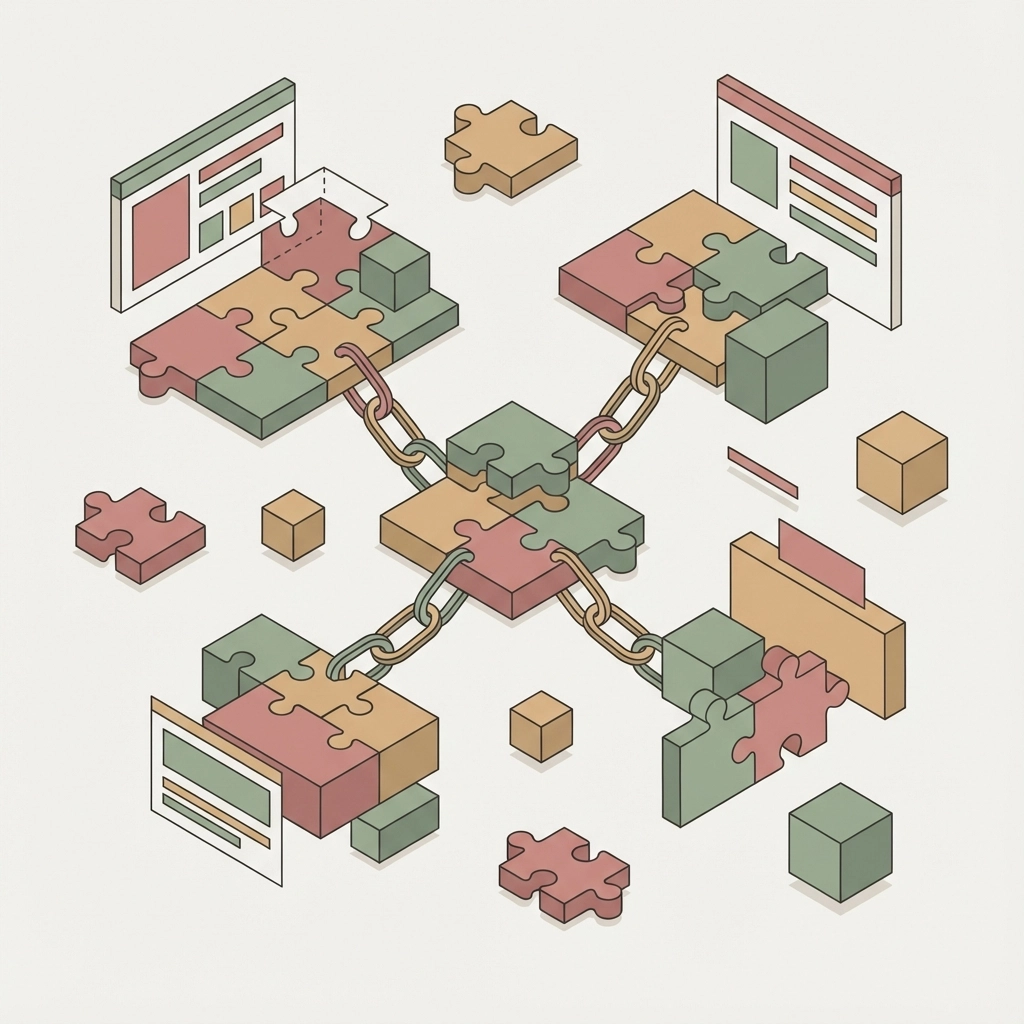
The Documentation Mistake That Costs Millions
Here's a bonus mistake that underlies all the others: relying on verbal promises from Salesforce sales reps.
"We usually don't enforce that clause." "We'll work with you if that situation comes up." "Trust me, we're flexible on overages."
If it's not written in your contract or order form, it doesn't exist. Period.
The Fix: Demand that every concession, promise, and "understanding" be documented in writing. If your sales rep claims flexibility exists, prove it by adding contract language that guarantees it.
Taking Control of Your Salesforce Investment
These mistakes aren't inevitable: they're the result of approaching salesforce enterprise license agreement negotiations without proper preparation and expertise. The key is treating your SELA like the multi-million dollar strategic decision it is, not just another software renewal.
Before your next negotiation:
- Conduct a thorough contract risk review of your current terms
- Benchmark your pricing against industry standards
- Assemble a cross-functional team including IT, finance, procurement, and legal
- Document your actual usage patterns and realistic growth projections
Remember, Salesforce's sales team negotiates these deals every day. You might do it once every three years. The playing field isn't level unless you have the right strategy and support.
Your SELA should be a strategic enabler, not a financial anchor. By avoiding these five fatal mistakes, you can maintain the predictability and enterprise features you need while protecting your organization from unnecessary costs and inflexible terms.
The stakes are too high to get this wrong. Make sure your next Salesforce negotiation puts your organization in the driver's seat, not the passenger seat.
Need help navigating your Salesforce renewal? Our enterprise contract renewal specialists have saved organizations millions in unnecessary software costs. Learn more about our saas negotiation consulting services.
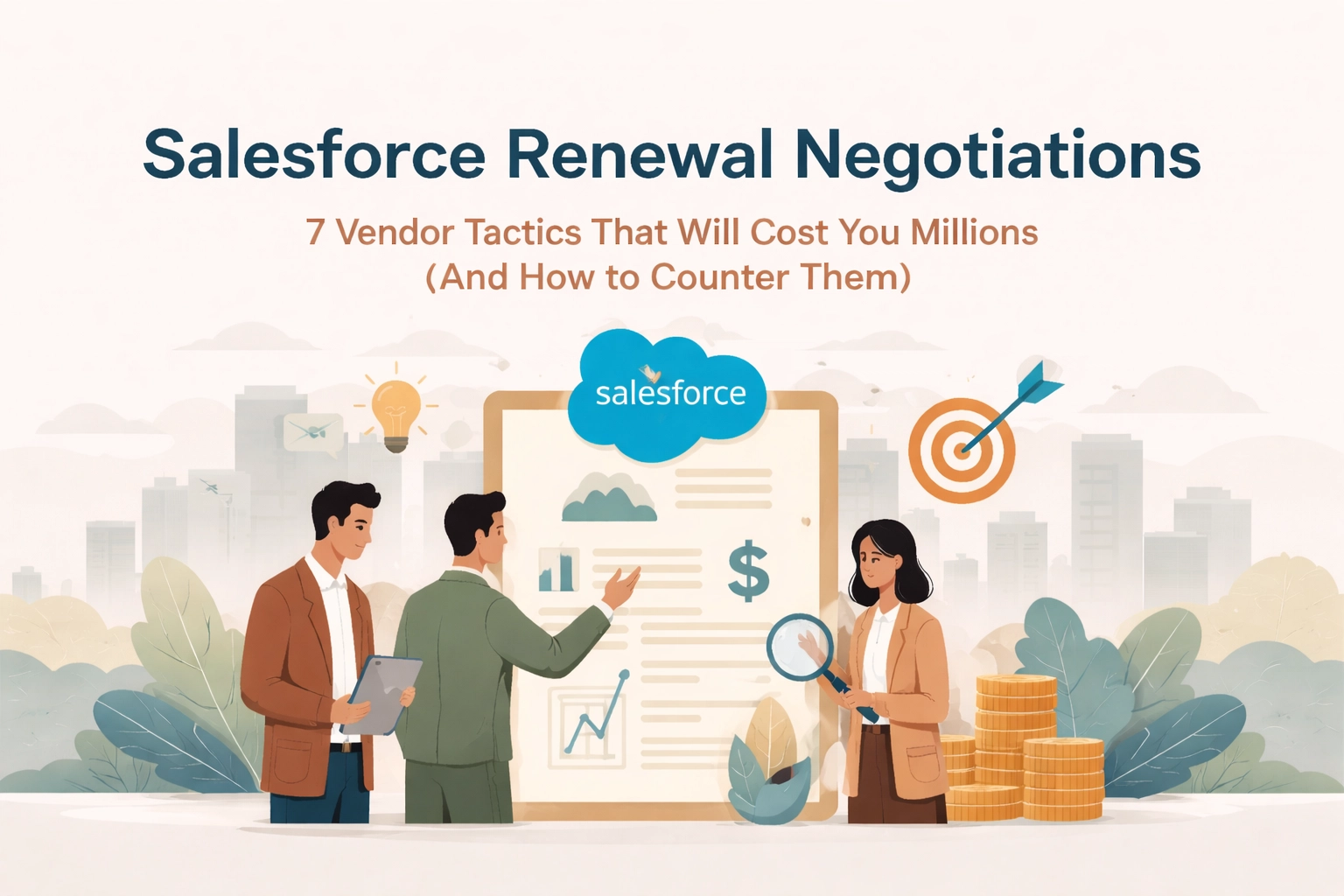
Salesforce Renewal Negotiations: 7 Vendor Tactics That Will Cost You Millions (And How to Counter Them)
Let's cut to the chase: Salesforce didn't become a $30+ billion company by accident. They've built a renewal machine that's incredibly effective at extracting maximum value from enterprise customers: often at your expense.
If you're a CIO, CFO, or procurement leader heading into a Salesforce renewal negotiation, you need to understand exactly what you're walking into. Because here's the uncomfortable truth: your Salesforce rep isn't your partner. They're a highly trained professional whose compensation depends on growing your contract value.
We've helped hundreds of enterprises navigate Salesforce contract negotiations, and we've seen every play in their playbook. Here are the seven tactics that cost organizations millions: and exactly how to counter each one.
Tactic #1: The Timing Trap
Salesforce will reach out months before your renewal: not to help you plan, but to control the conversation before you've had time to assess your actual needs. They'll frame this as "getting ahead of things" or "ensuring a smooth renewal."
Meanwhile, they're identifying upsell opportunities, understanding your budget cycle, and positioning themselves to apply pressure when you're most vulnerable.
The Counter-Move: Start your internal renewal planning 6 months before your renewal date. Audit your current usage, assess alternatives, and build executive alignment before Salesforce initiates contact. When you control the timeline, you control the negotiation.

Tactic #2: The Inflated Baseline
Here's a number Salesforce hopes you never discover: their initial renewal quote typically starts around 10% above your current spend: before any "negotiation" even begins.
Some of these increases are obvious (new list prices, added users) while others are buried in contract language and other means. The goal? Anchor the conversation at a higher number so that any "discount" they offer still results in you paying more than you should.
Furthermore, it's important to understand that your Salesforce AE has a 10%+ revenue uplift target at each renewal which creates an automatic conflict when you're trying to save money. If your account is a "flat" renewal from the previous contract year with no sign of new products/licenses/etc. then you'll be handed over to the renewal desk. This team is compensated differently with the ultimate objective of never allowing your account to decrease below your current spend. Naturally, this team is incentivized to ensure there is 5% revenue growth.
The Counter-Move: Conduct a thorough license audit before engaging. Many organizations discover they're paying for Premium editions when Standard would suffice, or carrying licenses for users who left the company years ago. Our Right Price Benchmarking™ service consistently reveals that enterprises overpay by 20-40% simply because they never questioned the baseline.
Tactic #3: The Automatic Uplift Clause
Buried in your Master Service Agreement are automatic renewal and price increase provisions. These clauses can escalate your costs by 3-7% annually: without any renegotiation, without any added value, and often without you even noticing until the invoice arrives.
The Counter-Move: Scrutinize your MSA for these provisions immediately. Calendar your renewal dates with 6-month advance alerts. When you do renegotiate, explicitly address these clauses and push for caps on annual increases or elimination of auto-renewal terms entirely.
Tactic #4: The True-Up Surprise
True-up clauses sound reasonable: you pay for what you actually use. In practice, they're a landmine waiting to explode your budget.
Without careful tracking, you might add users throughout the year thinking you're within your allocation: only to receive a six-figure true-up invoice at renewal. Salesforce counts on organizations losing track of their usage, and they're rarely wrong.
The Counter-Move: Implement quarterly internal audits to track actual usage against your contracted terms. Better yet, negotiate true-down rights into your contract: the ability to reduce licenses if your needs decrease, not just pay more when they increase.
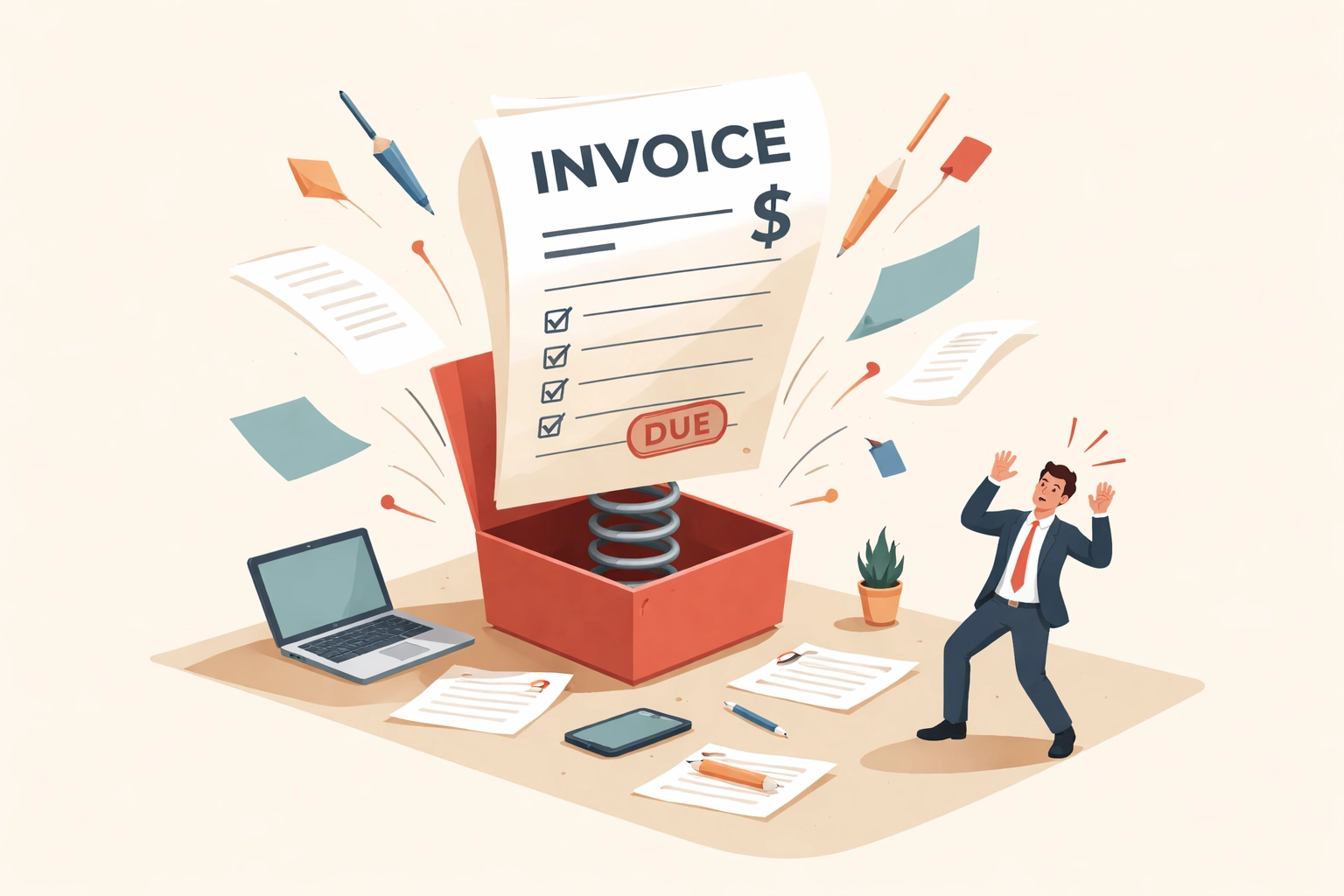
Tactic #5: The Bundle Trap
This is one of Salesforce's most effective plays. Your rep will offer a "significant discount" on your renewal: but only if you bundle it with additional products, users, or support tiers you didn't ask for.
"I can get you 15% off, but only if we include Marketing Cloud in this deal."
Suddenly, your "discounted" renewal costs more than your original contract, and you're locked into products you may never fully deploy.
The Counter-Move: Flip the script. Bundle your own negotiation asks strategically. Combine price discussions with user alignment, unused license returns, true-down rights, and multi-year price caps. When you present a comprehensive counter-proposal, you gain leverage instead of surrendering it.
Tactic #6: The Support Plan Squeeze
After your initial contract term, Salesforce will push hard to maintain: or upgrade: your Premier or Premier+ support plan. They'll cite "business continuity" and "access to expertise" as justifications.
Here's what they won't tell you: most organizations' support needs drop dramatically after the first year. Your admins get trained. Your users figure things out. The urgent tickets become routine questions.
The Counter-Move: Reassess your support plan annually based on actual ticket volume and complexity. Many enterprises can safely downgrade from Premier to Standard support after their initial term, saving significant budget while reducing upsell pressure from the support team.

Tactic #7: The Middleman Mirage
Your Salesforce account executive seems like your advocate. They're friendly, responsive, and always willing to "go to bat for you" on pricing.
Here's the reality: your AE has almost no authority to offer meaningful discounts. Real decisions happen at the SVP & EVP level in conjunction with Salesforce's Business Desk: a team you'll never meet directly. Your rep is an intermediary who controls the flow of information in both directions, and that information asymmetry benefits Salesforce, not you.
The Counter-Move: Develop clear, logical, outcomes-oriented messaging and ensure everyone your rep contacts delivers it consistently. Document everything in writing. When you hit a wall, escalate directly to the Business Desk through formal channels rather than relying on your rep to "see what they can do." This practice is an art and not a science...we have perfected the practice at TNG.
The Preparation Equation
Here's the framework that separates enterprises who get crushed in Salesforce renewal negotiations from those who walk away with favorable terms:
Spend 75% of your time on preparation. Only 25% on the actual negotiation.
That means:
- Building a comprehensive Salesforce CRM Solution Blueprint (specific editions, feature sets, user counts, and measured value for each application)
- Conducting honest internal assessments of what you actually need vs. what you're currently paying for
- Researching competitive alternatives: not necessarily to switch, but to establish credible leverage
- Aligning your executive team on priorities and walk-away points
Without this preparation, you're bringing a spreadsheet to a gunfight.
Why Impartiality Matters
At The Negotiator Guru (TNG), we don't sell Salesforce. We don't resell licenses. We don't take referral fees from vendors. Our only interest is getting you the best possible deal.
That impartiality is why our Right Price Benchmarking™ data is trusted by enterprises across industries. We know what companies like yours actually pay: not what Salesforce says companies pay.
When you walk into a negotiation armed with real benchmark data and proven counter-tactics, the dynamic shifts. Suddenly, you're not reacting to Salesforce's playbook. You're executing your own.
Ready to Take Control of Your Next Renewal?
Salesforce renewal negotiations don't have to be a losing battle. With the right preparation, the right data, and the right strategy, you can counter every tactic in their playbook and protect your organization from unnecessary spend.
If you're facing a Salesforce renewal in the next 6-12 months, now is the time to start preparing. Check out our Salesforce vendor spotlight for more insights, or explore our enterprise contract renewal solutions to see how we can help.
Because in Salesforce contract negotiation, the prepared win. Everyone else just pays the price.
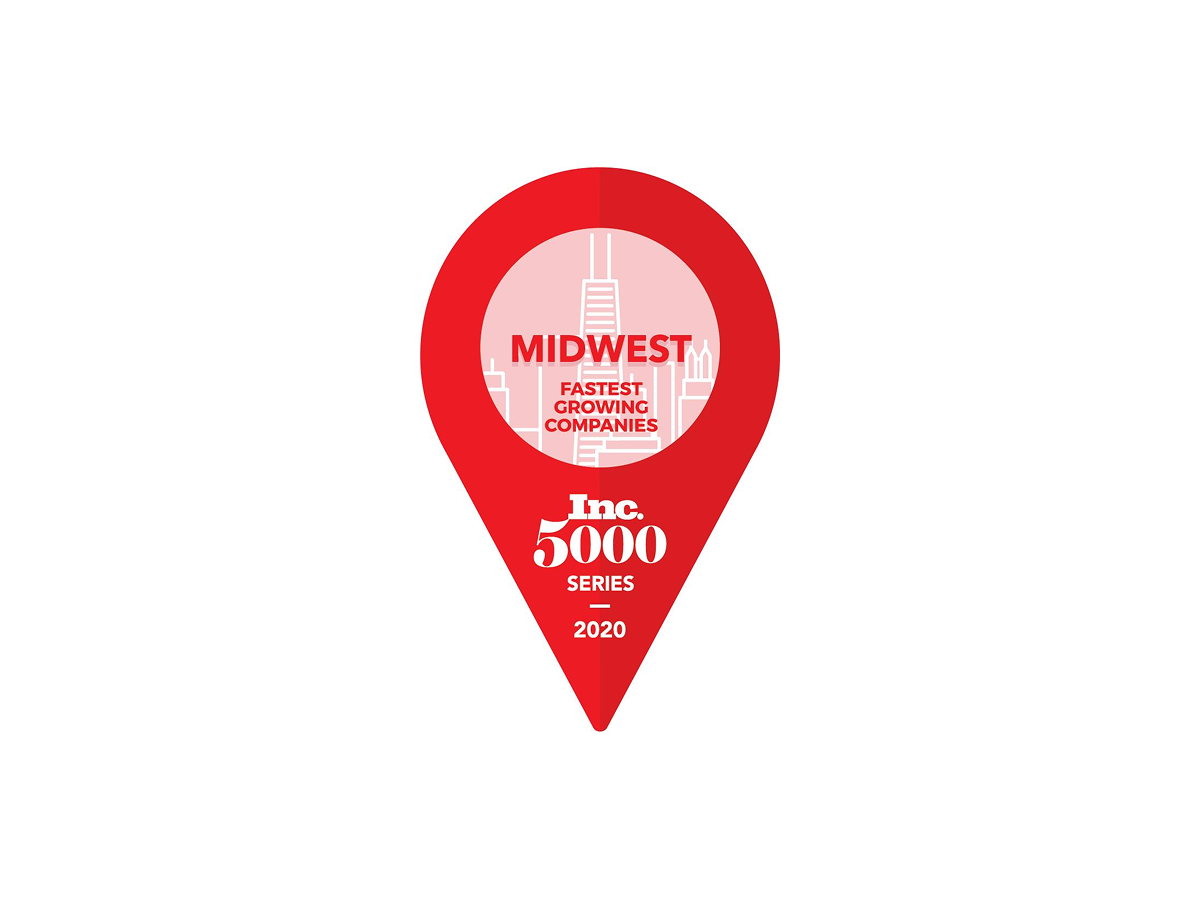
Inc. Magazine Unveils Its First-Ever List of the Midwest’s Fastest-Growing Private Companies— The Inc. 5000 Series: Midwest
The Negotiator Guru Ranks No. 15 on the inaugural 2020 Inc. 5000 Series: Midwest
NEW YORK, March 25, 2020 – Inc. magazine today revealed that The Negotiator Guru is No.15 on its inaugural Inc. 5000 Series: Midwest list, the most prestigious ranking of the fastest-growing private companies in Illinois, Indiana, Iowa, Kansas, Michigan, Minnesota, Missouri, Nebraska, North Dakota, Ohio, South Dakota, and Wisconsin.
Born of the annual Inc. 5000 franchise, this regional list represents a unique look at the most successful companies within the Midwest economy’s most dynamic segment—its independent small businesses.
“We’re honored to be recognized in the Inc. 5000 list as one of the fastest growing private companies in the Midwest,” said Dan Kelly, Founder and Senior Partner. The Negotiator Guru also ranked #2 in the state of Minnesota and #5 in the category of Business Products and Services. “Our success is a direct result of the value we’ve delivered with, and for, our global enterprise client base. Congratulations to the TNG team!”
The companies on this list show stunning rates of growth across all industries in the 12 Midwest states. Between 2016 and 2018, these 250 private companies had an average growth rate of 360 percent and, in 2018 alone, they employed more than 27,000 people and added $13 billion to the Midwest’s economy. Companies based in the Chicago, Detroit, and Cincinnati areas brought in the highest revenue overall. Complete results of the Inc. 5000 Series: Midwest, including company profiles and an interactive database that can be sorted by industry, metro area, and other criteria, can be found here starting March 25, 2020.
“The companies on this list demonstrate just how much the small-business sector impacts the economies of each Midwest state,” says Inc. editor in chief Scott Omelianuk. “Across every single industry, these businesses have posted revenue and growth rates that are beyond impressive, further proving the tenacity of their founders and CEOs.”
About The Negotiator Guru
The Negotiator Guru is the leading advisory firm for Salesforce contract negotiation. Our team of Senior IT Sourcing Experts provides industry leading IT contract negotiation services for a global client base. Clients engage us to source, negotiate, and manage highly complex IT contracts, transactions and suppliers. Through our deep business understanding and senior expert negotiation skills, we work closely with clients to deliver immediate and long-lasting financial impact to all stakeholders.
Founded in 2015, The Negotiator Guru is a private company based in Minneapolis, Minnesota. For more information, visit www.thenegotiator.guru. More about Inc. and the Inc.
5000 Regional Series
Methodology
The 2020 Inc. 5000 Regional Series is ranked according to percentage revenue growth when comparing 2016 and 2018. To qualify, companies must have been founded and generating revenue by March 31, 2016. They had to be U.S.-based, privately held, for profit, and independent—not subsidiaries or divisions of other companies—as of December 31, 2018. (Since then, a number of companies on the list have gone public or been acquired.) The minimum revenue required for 2016 is $100,000; the minimum for 2018 is $1 million. As always, Inc. reserves the right to decline applicants for subjective reasons.
Ready to explore joining the TNG family?
Contact us today to set-up a client intake assessment where we identify your cost savings opportunity for free!
------------------------------------------------------------------
Explore other TNG Featured Articles, Follow The Negotiator Guru on LinkedIn, Follow Dan Kelly on LinkedIn and Twitter. Learn more about What We Do.
About Inc. Media
The world’s most trusted business-media brand, Inc. offers entrepreneurs the knowledge, tools, connections, and community to build great companies. Its award-winning multiplatform content reaches more than 50 million people each month across a variety of channels including websites, newsletters, social media, podcasts, and print. Its prestigious Inc. 5000 list, produced every year since 1982, analyzes company data to recognize the fastest-growing privately held businesses in the United States. The global recognition that comes with inclusion in the 5000 gives the founders of the best businesses an opportunity to engage with an exclusive community of their peers, and the credibility that helps them drive sales and recruit talent. The associated Inc. 5000 Conference is part of a highly acclaimed portfolio of bespoke events produced by Inc. For more information, visit www.inc.com.


